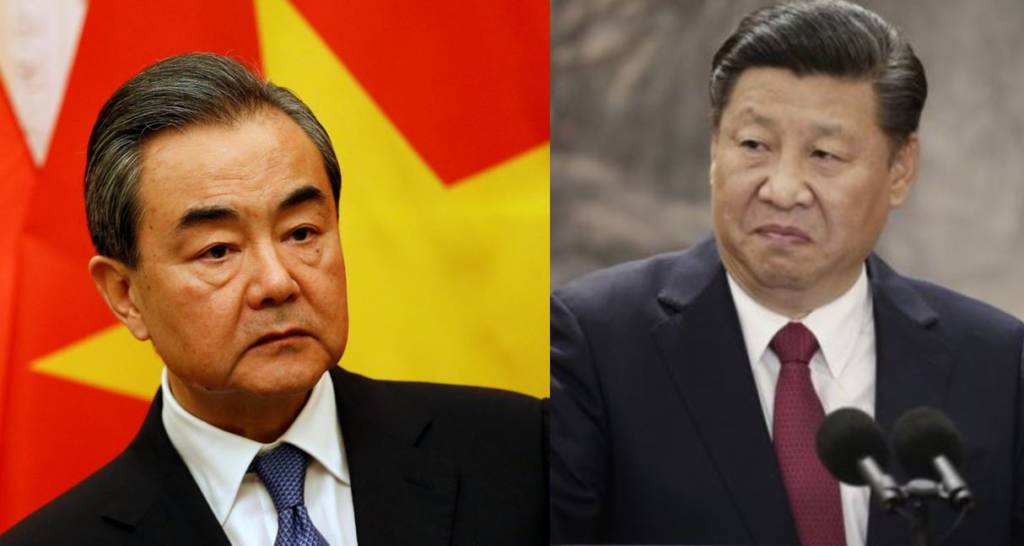Chinese Foreign Minister Wang Yi’s Europe tour is turning out to be a total disaster. Yi wants the European Union (EU) to cough up a Free Trade Agreement (FTA) but the EU has played its cards really well. The Angela Merkel-led European Union knows that China is facing a relentless diplomatic backlash around the world and is desperate for finalising a trade deal with the EU.
The Brussels-based organisation has therefore started negotiating from a higher position and has started asking Beijing for more and more concessions. As for China, it is wary of making concessions to the EU because the United States is watching closely and if the EU secures a favourable deal from Beijing, then the Trump administration would also start pushing for similar concessions from China.
Beijing is making unprecedented diplomatic overtures to the EU. While Yi himself is on a tour to Italy, the Netherlands, Norway, France and Germany, Yang Jiechi, CCP Foreign Affairs chief, is also going to visit Greece and Spain, and possibly Portugal next week. With these rare consecutive trips, China is pushing really hard for a trade deal with the EU. Beijing wants some respite amidst the Trump administration’s decoupling from China.
Beijing’s failure to secure a Free Trade Agreement from the EU has been a longstanding issue between the EU and China. The EU has Free Trade Agreements with over 70 countries in the world. Last year, it signed an FTA with Japan. The EU also concluded a free trade and investment protection deal with Vietnam and June and is now looking to finalise an FTA with India. But whenever China tries to discuss an FTA with the EU, the latter develops cold feet about it.
EU-China trade talks have hit a deadlock of sorts. The EU insists on greater transparency from China as well as the finalisation of the investment treaty talks before moving on to an FTA. But Beijing hasn’t been able to deliver.
According to SCMP, a European diplomatic source said that China is yet to address concerns about State-owned Enterprises (SOE) and increasing transparency about local-level subsidies. However, no EU country except Germany is ready to go ahead with a Free Trade Agreement (FTA) unless China relents on these issues.
An official EU website states, “The EU is committed to open trading relations with China. However, the EU wants to ensure that China trades fairly, respects intellectual property rights and meets its obligations as a member of the World Trade Organization (WTO).” It describes strong government intervention, discriminatory industrial policies, non-tariff measures and domination of SOE as other issues in the EU-China trade.
Moreover, the EU keeps bringing up the issue of an investment treaty with Beijing and refuses to go ahead with a trade deal unless an investment treaty is concluded. The investment treaty has emerged as a “test case” for the EU-China bilateral relations.
As for Beijing, it is not ready to make structural changes and give up unfair practices in global trade that have actually enriched it at the cost of others. Moreover, China doesn’t really have the option of being large-hearted and making a big concession to the European Union because the US is also keeping a close eye from outside.
According to Eurasia Group’s China analyst Kelsey Broderick, “If the US sees China making serious reform concessions to the EU, it might smell blood in the water and push even harder on reaching an agreement with Beijing.” Broderick also feels, “It would likely incentivise US actors to push China hard on phase two [trade deal] commitments.”
Now, China faces a Catch-22 situation in the European Union, particularly because if a Free Trade Agreement has to be signed then it has to be now when German Chancellor Merkel is in control of affairs. Once she is out of power, no leader in the European Union could bring together all the players on the board and sign the deal, because most of them don’t want to sign the deal. Merkel is due to leave office next year.
Germany currently holds the EU’s rotating chairmanship, but Portugal will take over from January next year. Beijing therefore only has a few months to zero in on a Free Trade Agreement with Brussels.
China is therefore poised to face some tough time in Europe in the coming days. Chinese President Xi Jinping will take part in a virtual summit with European leaders on September 14. If Xi doesn’t push investment talks during this Summit, then the EU might fall to the American pressure on taking a tough anti-China line.
Joerg Wuttke, EU Chamber of Commerce in China President said, “President Xi has a lot of political capital at stake in the September summit. If the investment talks do not get a push at that time, it will be politically difficult for [German Chancellor Angela] Merkel to discuss China issues at the European Council meeting on September 25, particularly at a time when the US is putting enormous pressure on Europe to fall in line with its position.”
If Chinese Foreign Minister Wang Yi wanted to overcome concerns around global decoupling from China, then his Europe tour is fast proving to be a major diplomatic faux pas. Beijing believed that it had a trusted partner in Angela Merkel, but it seems that Beijing is going to lose its last hope as Europe tries to wring it dry.
